|
|
|
Sort Order |
|
|
|
Items / Page
|
|
|
|
|
|
|
| Srl | Item |
| 1 |
ID:
178207
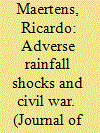

|
|
|
|
|
| Summary/Abstract |
News reports and policymakers frequently link African civil conflicts and wars to agricultural crises caused by droughts. However, empirical studies of the relationship between rainfall and civil conflict or war remain inconclusive. I reexamine this relationship focusing on rainfall over each country’s agricultural land during the growing seasons. I also incorporate that the relationship between rainfall and agricultural output is hump-shaped, as rainfall beyond a threshold decreases output. I find a U-shaped relationship between rainfall and the risk of civil conflict and war in (Sub-Saharan) African countries. This relationship mirrors the hump-shaped relationship between rainfall and agricultural output.
|
|
|
|
|
|
|
|
|
|
|
|
|
|
|
|
| 2 |
ID:
110804
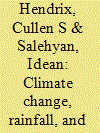

|
|
|
|
|
| Publication |
2012.
|
| Summary/Abstract |
Much of the debate over the security implications of climate change revolves around whether changing weather patterns will lead to future conflict. This article addresses whether deviations from normal rainfall patterns affect the propensity for individuals and groups to engage in disruptive activities such as demonstrations, riots, strikes, communal conflict, and anti-government violence. In contrast to much of the environmental security literature, it uses a much broader definition of conflict that includes, but is not limited to, organized rebellion. Using a new database of over 6,000 instances of social conflict over 20 years - the Social Conflict in Africa Database (SCAD) - it examines the effect of deviations from normal rainfall patterns on various types of conflict. The results indicate that rainfall variability has a significant effect on both large-scale and smaller-scale instances of political conflict. Rainfall correlates with civil war and insurgency, although wetter years are more likely to suffer from violent events. Extreme deviations in rainfall - particularly dry and wet years - are associated positively with all types of political conflict, though the relationship is strongest with respect to violent events, which are more responsive to abundant than scarce rainfall. By looking at a broader spectrum of social conflict, rather than limiting the analysis to civil war, we demonstrate a robust relationship between environmental shocks and unrest.
|
|
|
|
|
|
|
|
|
|
|
|
|
|
|
|
| 3 |
ID:
143324
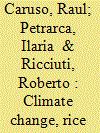

|
|
|
|
|
| Summary/Abstract |
This article contributes to the literature on the nexus between climate change and violence by focusing on Indonesia over the period 1993–2003. Rice is the staple food in Indonesia and we investigate whether its scarcity can be blamed for fueling violence. Following insights from the natural science literature, which claims that increases in minimum temperature reduce rice yields, we maintain that increases in minimum temperature reduce food availability in many provinces, which in turn raises the emergence of actual violence. We adopt an instrumental variable approach and select the instruments taking into account the rice growing calendar. Results show that an increase of the minimum temperature during the core month of the rice growing season, that is, December, determines an increase in violence stimulated by the reduction in future rice production per capita. Results are robust across a number of different functional specifications and estimation methods. From a methodological point of view, we claim that the inconclusive results obtained in this literature may be caused by an overlook of the correct bundle crop/temperature. Studies concentrating on several countries with different crops and using variations of average temperature as a measure of climate change missed the biological mechanism behind the relationship between climate change and violence.
|
|
|
|
|
|
|
|
|
|
|
|
|
|
|
|
| 4 |
ID:
110805
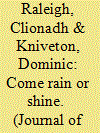

|
|
|
|
|
| Publication |
2012.
|
| Summary/Abstract |
Previous research on environment and security has contested the existence, nature and significance of a climate driver of conflict. In this study, we have focused on small-scale conflict over East Africa where the link between resource availability and conflict is assumed to be more immediate and direct. Using the parameter of rainfall variability to explore the marginal influence of the climate on conflict, the article shows that in locations that experience rebel or communal conflict events, the frequency of these events increases in periods of extreme rainfall variation, irrespective of the sign of the rainfall change. Further, these results lend support to both a 'zero-sum' narrative, where conflicting groups use force and violence to compete for ever-scarcer resources, and an 'abundance' narrative, where resources spur rent-seeking/wealth-seeking and recruitment of people to participate in violence. Within the context of current uncertainty regarding the future direction of rainfall change over much of Africa, these results imply that small-scale conflict is likely to be exacerbated with increases in rainfall variability if the mean climate remains largely unchanged; preferentially higher rates of rebel conflict will be exhibited in anomalously dry conditions, while higher rates of communal conflict are expected in increasingly anomalous wet conditions.
|
|
|
|
|
|
|
|
|
|
|
|
|
|
|
|
| 5 |
ID:
178732
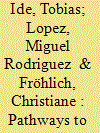

|
|
|
|
|
| Summary/Abstract |
As hydro-meteorological hazards are predicted to become more frequent and intense in the future, scholars and policymakers are increasingly concerned about their security implications, especially in the context of ongoing climate change. Our study contributes to this debate by analysing the pathways to water-related conflict onset under drought conditions in the Middle East and North Africa (MENA) region between 1996 and 2009. It is also the first such analysis that focuses on small-scale conflicts involving little or no physical violence, such as protests or demonstrations. These nonviolent conflicts are politically relevant, yet understudied in the literature on climate change and conflict, environmental security, and political instability. We employ the method of qualitative comparative analysis (QCA) to integrate quantitative and qualitative data at various scales (national, regional, local) for a sample of 34 cases (17 of which experienced conflict onset). Our findings show that pre-existing cleavages and either autocratic political systems or cuts of the public water supply are relevant predictors of nonviolent, water-related conflict onset during droughts. Grievances deeply embedded into socio-economic structures in combination with a triggering event like a drought or water cuts are hence driving such water-related conflicts, especially in the absence of proper political institutions. We thus argue that drought–conflict links are highly context-dependent even for nonviolent, local conflicts, hence challenging determinist narratives that claim direct interlinkages between climate change, hydro-meteorological disasters and conflict.
|
|
|
|
|
|
|
|
|
|
|
|
|
|
|
|
| 6 |
ID:
091720
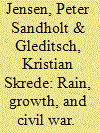

|
|
|
|
|
|
|
|